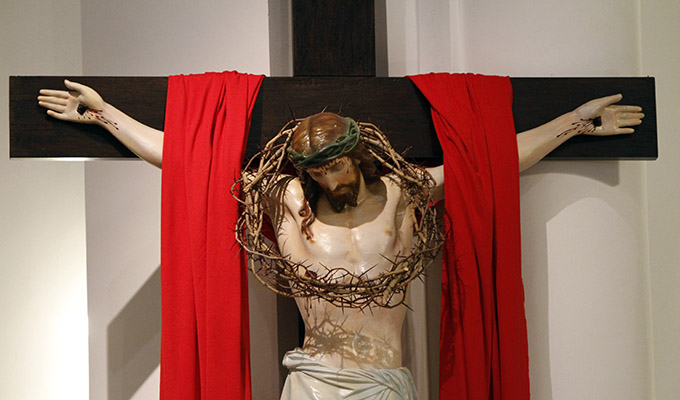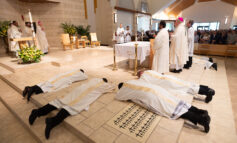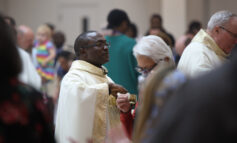
The crucifix is displayed with a crown of thorns and red banners during the celebration of Good Friday Mass at the Cathedral Shrine of Virgin of Guadalupe in March 2016. (BEN TORRES/Special Contributor)
By Father Thomas Esposito
Special to The Texas Catholic
Among the myriad treasures of Sacred Scripture, one of the most neglected has to be the Letter to the Hebrews. It receives relatively little attention in the liturgy, and I imagine few people would be able to recall any recognizable theme or passage from the book. Many might even think it forms part of the Old Testament, given its name. The most frequent usage of the title, at least in my experience with college students, comes as the response to a distinctly lame joke: “Question: How does Moses make his coffee? Answer: Hebrews it!”
Besides the Passion Narratives in the four Gospels, perhaps no other biblical book offers such fruitful Lenten meditation points as the Letter to the Hebrews. It offers, like so many other letters in the New Testament, “a message of encouragement” (13:22) for Christians, most likely converts from Judaism, in the face of temptations to weariness or apostasy.
The unknown author of Hebrews draws on many Old Testament passages to formulate his explanation of the mystery of Christ. The opening verses outline the marvelous plan God has unveiled over the course of human history: “In times past, God spoke in partial and various ways to our ancestors through the prophets; in these last days, He spoke to us through a son, whom He made heir of all things and through whom He created the universe” (1:1-2). Jesus, the son of God, possesses a dignity far greater than the angels (1:5-13), and he is described as the great “high priest” (4:14), the priest “according to the order of Melchizedek” (chapter 7) and, most significantly for our Lenten meditation, the sacrifice whose blood atones for the sins of all the people (chapters 9-10).
The figure of Melchizedek is little known to Christians, largely because he appears for a fleeting moment in the book of Genesis and then once more in Psalm 110. He is, according to Genesis 14:18, the “king of Salem” (Salem comes from shalom, meaning “peace”) and a “priest of God Most High.” He encounters Abram after a military victory, blessing him and bestowing on him bread and wine. The author of Hebrews sees in this mysterious man a prefiguring of Jesus Christ, the eternal “king of peace” who remains a priest forever (Hebrews 7:1-4). Jesus, as a priest “according to the order of Melchizedek” (Psalm 110:4) and not a Levite priest, has offered one single and definitive sacrifice instead of the many continual sacrifices required by the Law of Moses. He, the eternal priest, has offered himself as the sacrifice on the cross, and his blood shed during his passion has brought about the forgiveness of sins (9:22).
The incarnation of the eternal son, and the willingness of Jesus the son to sacrifice himself on our behalf, reveal how zealously God desires to aid Christians who are tempted to abandon their faith or choose an easier path: “Because [Christ] himself was tested through what he suffered, he is able to help those who are being tested” (2:18). Highlighting the faith and perseverance of the great Old Testament figures who awaited the coming of Christ (chapter 11), the author of Hebrews rouses his readers, then as now, to continue in faith, knowing that they have Christ himself and the saints interceding for them:
“Therefore, since we are surrounded by so great a cloud of witnesses, let us rid ourselves of every burden and sin that clings to us and persevere in running the race that lies before us while keeping our eyes fixed on Jesus, the leader and perfecter of faith. For the sake of the joy that lay before him, he endured the cross, despising its shame, and has taken his seat at the right of the throne of God. Consider how he endured such opposition from sinners, in order that you may not grow weary and lose heart. In your struggle against sin, you have not yet resisted to the point of shedding blood” (12:1-4). Such a “word” cannot help but enkindle our hearts as we take up the crosses of our life, and serves as a wonderful prelude to the coming memorial of our Lord’s passion.
Father Thomas Esposito, O.Cist., is a theologian and monk at the Cistercian Abbey of Our Lady of Dallas in Irving. His column appears occasionally in The Texas Catholic.



